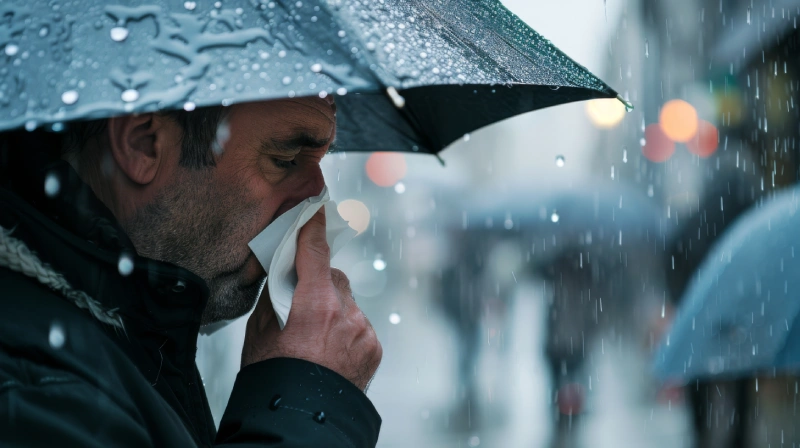The rainy season in Costa Rica brings an increase in the incidence of various seasonal illnesses. This change can affect people through respiratory allergies, ear infection from allergies, allergic rhinitis or sinusitis, and other allergies. Yes, most of these illnesses are due to allergies, but if not properly cared for, a poorly treated allergy symptom can lead to discomfort, such as when cold symptoms not going away for days, weeks, or even months, which could end up resulting in other illnesses like ear infection from allergies.
The most common seasonal illnesses during the rainy season
Getting vaccinated or taking other preventive actions reduces risks for the most vulnerable population and helps avoid discomforts like flu symptoms type B. However, these are not the only seasonal illnesses, as we have mentioned. Allergic rhinitis or sinusitis is also very common, as well as allergy symptoms in skin, ear infection from allergies, and even mosquito-borne diseases due to increased insect populations because of the humidity.
When cold symptoms not going away

A common cold can become persistent during the rainy season due to high humidity and the proliferation of viruses. When cold symptoms not going away, we notice sneezing, nasal congestion, sore throat, and cough. We should alert to signs of other infections when cold symptoms not going away and persist for more than a week. In fact, when cold symptoms not going away, it can cause allergic rhinitis or sinusitis if not properly treated.
Respiratory allergies and allergic rhinitis or sinusitis
Respiratory allergies and allergic rhinitis or sinusitis are common during the rainy season due to increased humidity and mold. Symptoms include sneezing, itchy nose, watery eyes, and nasal congestion. Allergic rhinitis can worsen and lead to sinusitis if not properly treated. As mentioned earlier, the best thing to do in these cases is to see a doctor to treat respiratory allergies and any resulting infections.
In these cases, the doctor may prescribe antibiotics, but we must remember that at the onset of any seasonal illness, and without a prescription, antibiotics should not be taken. To alleviate allergic rhinitis or sinusitis, you can use nasal decongestants or saline nasal washes, and avoid the allergen that initially caused the respiratory allergies and continues to make the cold symptoms not going away.
Ear infection from allergies

Respiratory allergies, including allergic rhinitis or sinusitis, end up causing fluid buildup in the middle ear, leading to ear infection from allergies. Symptoms of ear infection from allergies include ear pain, a feeling of fullness in the ear, and temporary hearing loss. In these cases of ear infection from allergies, treatment focuses on controlling the allergy, nasal washes, and exercises like chewing or yawning to relieve pressure. Also, to better address ear infection from allergies, a doctor’s consultation will be necessary to treat the infection with the required dose of antibiotics.
Allergy symptoms in skin
Having allergy symptoms in skin is another common seasonal illnesses. Exposure to mold and insects can cause skin rashes, itching, and redness, among other allergy symptoms in skin. Respiratory allergies can also lead to allergy symptoms in skin as an immune response or due to a weakened immune system when cold symptoms not going away. There are also cases where we detect allergy symptoms in skin caused by mosquito-borne diseases, chickenpox, or measles.
Flu symptoms type B
The flu is another seasonal illness that worsens during the rainy season. This seasonal illness is caused by the influenza virus, of which there are three types: A, B, and C. Flu symptoms type B are the most common in humans. Flu symptoms type B include fever, muscle aches, fatigue, and dry cough. These can quickly worsen, so it’s important to monitor the daily progression of flu symptoms type B. To prevent this, several preventive measures are taken, including the flu vaccine. Although a vaccine will not 100% prevent flu symptoms type B or other types throughout the season, it will reduce the likelihood of infection and severity.
Mosquito-borne diseases
Mosquito-borne diseases, such as dengue, Zika, and chikungunya, increase during the rainy season. Stagnant water creates an ideal environment for mosquito breeding. Symptoms of mosquito-borne diseases include high fever, headache, rashes, and joint pain. The order, intensity, and specifics can vary depending on which mosquito-borne diseases were contracted, but in all cases, hydration, rest, and the use of pain relievers are necessary.
Medical consultation is also required to avoid complications. What complications can these mosquito-borne diseases bring? These cases can become critical or even fatal, such as hemorrhages, persistent pain, or, in the case of pregnant women, neurological complications in the fetus.
Health tips for seasonal illnesses
Continuous hygiene

Washing hands, filtering the air, and maintaining hygiene inside and outside the house prevent the spread of viruses in the case of flu symptoms type B, allergic rhinitis or sinusitis, ear infection from allergies or respiratory allergies in general. It also helps reduce Allergy symptoms in skin from dust or mold.
Balanced diet
Our immune systems constantly fight viruses and bacteria, and the best way to help them is by providing the best resources through a balanced diet. We can add supplements if needed, but we must focus on ensuring our meals are properly proportioned with each nutrient to avoid seasonal illnesses and complications when cold symptoms not going away.
Use of insect repellents
Applying repellents containing DEET, picaridin, or lemon eucalyptus oil prevents mosquito bites, thereby preventing mosquito-borne diseases and Allergy symptoms in skin due to bites. However, this point will be useless if we do not eliminate all sources of stagnant water, whether clean or dirty.
Annual flu vaccination
Getting vaccinated annually reduces the risk of the influenza virus, prevents flu symptoms type B and other categories, or reduces their spread, mortality, or complications.
Adequate hydration
Yes, even though it is the rainy season, we can still face dehydration, either as a consequence or cause of these seasonal illnesses. If you want to learn more about signs of dehydration and hydration tips, you can read more in our article.
To relieve ear infection from allergies
Doing chewing or yawning exercises will prevent hearing loss due to inflammation, and applying warm compresses to the affected ear will relieve pain and reduce inflammation.
Corticosteroid creams for skin allergies
Using corticosteroid creams or ointments to reduce inflammation and itching in the skin. They are available in different strengths and forms, including creams, ointments, and lotions. There are also emollients and moisturizers made from natural products such as oatmeal and aloe vera that help soothe the skin, reduce itching, and rebuild the barrier damaged by Allergy symptoms in skin.
Ready for the next season?

Preparing for the rainy season in Costa Rica is essential to maintaining good health. By staying informed, you can reduce the risk of seasonal illnesses and better manage symptoms if they appear. Maintaining a clean environment, strengthening the immune system, and using adequate protection are key steps to taking care of your health during this period. With these strategies, you will be better prepared to face the season and maintain your overall well-being.
Don’t forget that if you have any questions or health emergencies, you can contact Express Medical.




